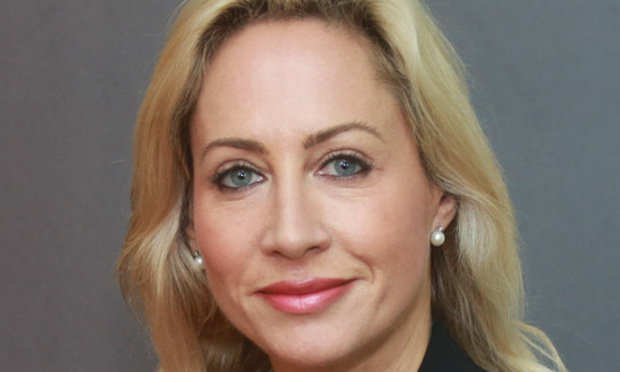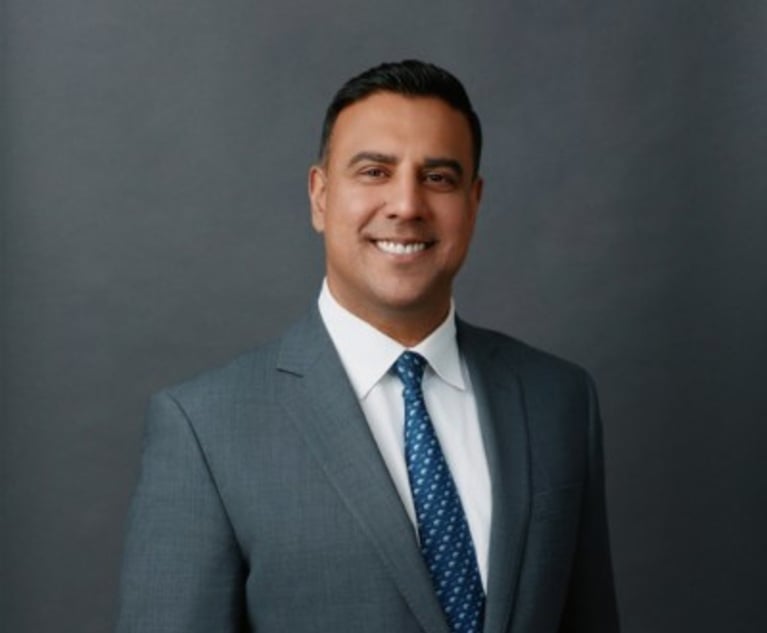'I hope this is the start of something bigger' - Barclays UK GC Pagni on 'turbo-charging' technology in law
Barclays UK GC Stephanie Pagni on the bank's launch of a law-tech hub and what she expects from partner law firms
April 27, 2018 at 08:47 AM
5 minute read
Legal technology incubators have been described as the Starbucks of the legal industry, with one seemingly popping up on almost every corner.
But while many law firms are looking to get in on the ground floor with tech startups that could blossom into lucrative clients, Barclays has taken a different tack with its own venture, teaming up with 13 law firms, PwC and the Law Society in a collaborative effort to "turbo-charge the UK's law-tech sector".
The initiative is the brainchild of Barclays UK GC, Stephanie Pagni. Just a year into her role, she has made it clear that legal tech is a big priority for the bank.
"Obviously there is a lot of focus on the fintech area, particularly over the last five years in London, but it occurred to us that while some developments in legal tech are still relatively embryonic, there is no doubt that there is a lot more to come," says Pagni.
The new hub, which will be located in Notting Hill, is part of Barclays' 'Eagle Labs' programme, which was launched in 2016 as part of the bank's citizenship strategy to help drive economic growth in the communities in which it operates.
Barclays already has 14 other Eagle Labs dotted around the UK, including one in Cambridge that already hosts a handful of legal tech startups, but this newest launch will ramp up the initiative's focus on legal technology.
As Pagni, who took up her current role in March 2017, comments: "It kicked of last year when I took over this role and went to visit some of the labs. I was so impressed that it inspired me and my team in legal to think: 'Well, couldn't we do something more in our field?'"
Pagni has been at the bank for more than 12 years after joining from Allen & Overy in late 2005. She was previously global head of litigation, and took over the UK GC role last year from Mark Chapman, who is now general counsel at Nationwide.
Commenting on the application process for the law-tech lab, she says Barclays will invite groups of applicants of between two and eight people to pitch to work in the hub. "As we are focused on legal tech and reg-tech, the requirement is to have a proposition or a business idea that will help to positively disrupt either of those areas.
"The typical applicant has usually already acquired seed funding and already have a concept. We also want diverse propositions, so we will look not just at commercial applications, but also 'law for good' applications."
Barclays will not provide financial support, but Pagni notes the venture does offer benefits such as connections to the bank, its network and access to venture capitalists.
There is no set timeframe in terms of how long successful applicants will remain in the lab. "We will go through the process and once all the spaces are filled, we will keep things under review. Once they are past the startup and incubation phase, they won't need to be in the lab anymore."
Key to the launch was signing up 13 law firms, as well as other industry players including the Law Society and startup community Legal Geek. The law firms signed up are Allen & Overy, Baker McKenzie, Brethertons, Capital Law, Clifford Chance, Clyde & Co, DWF, Gowling WLG, Latham & Watkins, Norton Rose Fulbright, Simmons & Simmons, SO Legal and TLT.
"We looked at law firms with an interest in this area, and we looked at a whole spectrum from big commercial firms to smaller firms," says Pagni. "We want the partner law firms to be available to provide guidance and support, to attend some of the events and sponsor some of the events. We also want them to send in lawyers to get exposure."
Pagni adds that it is not obligatory for Barclays' panel law firms to be involved in this project. The bank is currently carrying out the last ever formal review of its global legal panel, after announcing that it is moving a new system that will see external advisers continually assessed and added or removed from the panel on an ad hoc basis.
The bank's UK in-house legal team has also played a key role in setting up the law-tech lab.
"The legal team was involved in the whole process, from identifying potential partners, to advising on repurposing branches of Barclays sites, right through to the fitout of those sites to become co-working places. It has been a team effort," says Pagni.
"There weren't too many tricky legal issues, but it took several months to get there and the team has done a really good job," she adds.
Going forward, the legal team will be encouraged to make regular visits to the legal lab: "There will be people spending a day there, or a week or just a couple of days a month. There will be all sorts of variations for lawyers. This could potentially be of benefit to the whole legal function."
In future, Pagni says Barclays may consider more legal-tech launches. "If it is successful, there is no reason why we wouldn't consider other future legal-tech sites. I very much hope this is the start of something bigger."
- Barclays global head of innovation and commercial for legal David McCahon is among the speakers at this year's Strategic Technology Forum, which will take place in Italy this June. Subjects on the agenda include AI, the war for tech-savvy millennial talent, and how to react to a public hacking. Click here for more information.
This content has been archived. It is available through our partners, LexisNexis® and Bloomberg Law.
To view this content, please continue to their sites.
Not a Lexis Subscriber?
Subscribe Now
Not a Bloomberg Law Subscriber?
Subscribe Now
NOT FOR REPRINT
© 2025 ALM Global, LLC, All Rights Reserved. Request academic re-use from www.copyright.com. All other uses, submit a request to [email protected]. For more information visit Asset & Logo Licensing.
You Might Like
View All
Hogan Lovells Hires Team of Top White & Case Corporate and Finance Partners in Italy
2 minute read
Clifford Chance, Milbank Steer Yondr Group’s $900M Debt Financing in Malaysia

Kirkland, Paul Hastings, White & Case, Freshfields advise on Top German Deals
2 minute readTrending Stories
- 1Uber Files RICO Suit Against Plaintiff-Side Firms Alleging Fraudulent Injury Claims
- 2The Law Firm Disrupted: Scrutinizing the Elephant More Than the Mouse
- 3Inherent Diminished Value Damages Unavailable to 3rd-Party Claimants, Court Says
- 4Pa. Defense Firm Sued by Client Over Ex-Eagles Player's $43.5M Med Mal Win
- 5Losses Mount at Morris Manning, but Departing Ex-Chair Stays Bullish About His Old Firm's Future
Who Got The Work
J. Brugh Lower of Gibbons has entered an appearance for industrial equipment supplier Devco Corporation in a pending trademark infringement lawsuit. The suit, accusing the defendant of selling knock-off Graco products, was filed Dec. 18 in New Jersey District Court by Rivkin Radler on behalf of Graco Inc. and Graco Minnesota. The case, assigned to U.S. District Judge Zahid N. Quraishi, is 3:24-cv-11294, Graco Inc. et al v. Devco Corporation.
Who Got The Work
Rebecca Maller-Stein and Kent A. Yalowitz of Arnold & Porter Kaye Scholer have entered their appearances for Hanaco Venture Capital and its executives, Lior Prosor and David Frankel, in a pending securities lawsuit. The action, filed on Dec. 24 in New York Southern District Court by Zell, Aron & Co. on behalf of Goldeneye Advisors, accuses the defendants of negligently and fraudulently managing the plaintiff's $1 million investment. The case, assigned to U.S. District Judge Vernon S. Broderick, is 1:24-cv-09918, Goldeneye Advisors, LLC v. Hanaco Venture Capital, Ltd. et al.
Who Got The Work
Attorneys from A&O Shearman has stepped in as defense counsel for Toronto-Dominion Bank and other defendants in a pending securities class action. The suit, filed Dec. 11 in New York Southern District Court by Bleichmar Fonti & Auld, accuses the defendants of concealing the bank's 'pervasive' deficiencies in regards to its compliance with the Bank Secrecy Act and the quality of its anti-money laundering controls. The case, assigned to U.S. District Judge Arun Subramanian, is 1:24-cv-09445, Gonzalez v. The Toronto-Dominion Bank et al.
Who Got The Work
Crown Castle International, a Pennsylvania company providing shared communications infrastructure, has turned to Luke D. Wolf of Gordon Rees Scully Mansukhani to fend off a pending breach-of-contract lawsuit. The court action, filed Nov. 25 in Michigan Eastern District Court by Hooper Hathaway PC on behalf of The Town Residences LLC, accuses Crown Castle of failing to transfer approximately $30,000 in utility payments from T-Mobile in breach of a roof-top lease and assignment agreement. The case, assigned to U.S. District Judge Susan K. Declercq, is 2:24-cv-13131, The Town Residences LLC v. T-Mobile US, Inc. et al.
Who Got The Work
Wilfred P. Coronato and Daniel M. Schwartz of McCarter & English have stepped in as defense counsel to Electrolux Home Products Inc. in a pending product liability lawsuit. The court action, filed Nov. 26 in New York Eastern District Court by Poulos Lopiccolo PC and Nagel Rice LLP on behalf of David Stern, alleges that the defendant's refrigerators’ drawers and shelving repeatedly break and fall apart within months after purchase. The case, assigned to U.S. District Judge Joan M. Azrack, is 2:24-cv-08204, Stern v. Electrolux Home Products, Inc.
Featured Firms
Law Offices of Gary Martin Hays & Associates, P.C.
(470) 294-1674
Law Offices of Mark E. Salomone
(857) 444-6468
Smith & Hassler
(713) 739-1250










